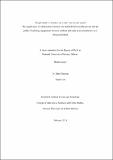| dc.contributor.advisor | Canavan, John | |
| dc.contributor.author | Garrity, Sheila | |
| dc.date.accessioned | 2014-02-26T09:56:41Z | |
| dc.date.available | 2014-02-26T09:56:41Z | |
| dc.date.issued | 2014-02-17 | |
| dc.identifier.uri | http://hdl.handle.net/10379/4216 | |
| dc.description.abstract | Irish society has undergone significant economic and social transformation in the past two decades. The rapid development of the early years sector, supporting unprecedented levels of female employment, is indicative of this transformation. While the use of early years services can be perceived as a functional act, the process is also an emotional one, as a parent's basic obligation to care is transferred to another. This thesis focuses on these newly established social and familial behaviours, offering an exploration of relationships between parents and childcare practitioners, within a changing Irish context.
The exploratory approach to research employed an ethnographic methodology, underpinned by a social constructionist epistemology to investigate these under-studied relationships. The research findings were analysed through the theoretical lens of the ethic of care, as well as drawing on theories and literature from relevant areas. Key research findings reveal ideas and concepts that support an understanding of the nature of the relationships under study: the concept of trust and its enigmatic construction in these relationships; the responsive, interdependent nature of the relationships; the community aspect, representing a process and potential outcome of these relationships, as well as suggesting a micro-level context within which these actors engage; the marketplace highlights the broader context, and the repositioning of care from the private/domestic realm to the public/productive realm; the concept of an evolving maternal identity underpins the proposed developmental process and illustrative model suggesting both temporal and functional elements to these relationships.
Our understanding of the role of ECEC services and particularly, early years practitioners, in supporting families through these significant transitions is enhanced through these research findings. The thesis highlights the need to conceptualisation how early years settings could best meet the needs of families in their daily lived experiences, rather than the reactive and ad hoc approach that has characterised the Irish state's approach to policy and programme development for the sector. | en_US |
| dc.rights | Attribution-NonCommercial-NoDerivs 3.0 Ireland | |
| dc.rights.uri | https://creativecommons.org/licenses/by-nc-nd/3.0/ie/ | |
| dc.subject | Early childhood care and education/ECEC | en_US |
| dc.subject | Ethnography | en_US |
| dc.subject | Ethic of care | en_US |
| dc.subject | Caregiver relationships | en_US |
| dc.subject | Trust | en_US |
| dc.subject | Maternal identity | en_US |
| dc.subject | Communities of care | en_US |
| dc.subject | Repositioning of care | en_US |
| dc.subject | Market-based care | en_US |
| dc.subject | Shifting familial behaviours | en_US |
| dc.subject | Political Science and Sociology | en_US |
| dc.title | 'People think it's not the real world - but it's our world'. The significance of relationships found on the threshold between the private and the public: Exploring engagement between mothers and early years practitioners in a changing Ireland. | en_US |
| dc.type | Thesis | en_US |
| dc.local.note | This ethnographic study was set within the context of changing family patterns and social behaviours in contemporary Ireland. With mothers increasingly engaged in the labour-market, non-parental childcare has become significant in Irish families' lives. Key findings reveal the complex, dynamic and evolving nature of the relationships between mothers and caregivers. | en_US |
| dc.local.final | Yes | en_US |
| nui.item.downloads | 3775 | |


